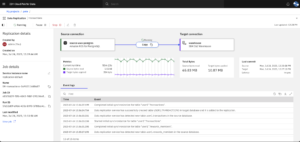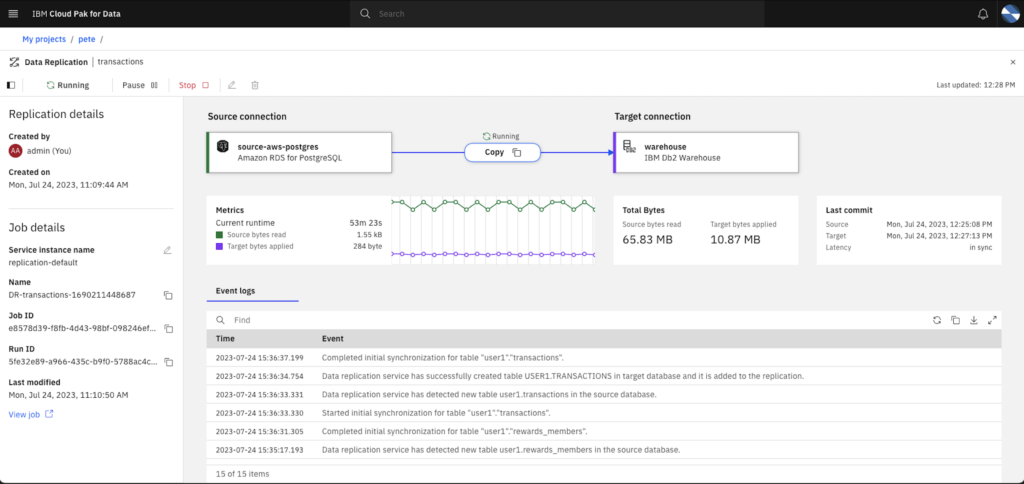Introduction:
In the dynamic world of Financial Services Institutions (FSI), the quest for reliable, efficient, and scalable data replication solutions is more crucial than ever. Among the myriad options available, IBM Data Replication stands out as a preferred choice for many FSI corporations. In this detailed exploration, we delve into the compelling reasons behind this trend and the key considerations that guide FSI organizations towards adopting IBM Data Replication.

I. Data Consistency and Accuracy:
1. Transactional Consistency:
FSI corporations handle vast amounts of transactional data where accuracy and consistency are paramount. IBM Data Replication ensures transactional integrity during the replication process, maintaining a reliable mirror of the source data.
II.Real-Time Data Availability:
2. Near-Real-Time Replication:
In FSI, timely access to data is critical for decision-making and regulatory compliance. IBM Data Replication offers near-real-time replication, ensuring that the target data is consistently up-to-date with the source.
III. Scalability and Performance:
3. Scalable Architecture:
The scalability of IBM Data Replication aligns with the growing demands of FSI corporations. As the volume of financial data increases, the solution can seamlessly scale to handle larger workloads without compromising performance.
4. Low Latency:
FSI applications often require low-latency data access. IBM Data Replication’s efficient log-based capture minimizes latency, making it suitable for scenarios where data freshness is critical.
IV. Disaster Recovery and High Availability:
5. Continuous Availability:
For FSI corporations, downtime is not an option. IBM Data Replication facilitates continuous availability by providing robust disaster recovery capabilities and ensuring high availability of data.
V. Heterogeneous Data Replication:
6. Support for Various Data Sources:
FSI environments are diverse, with various databases and systems. IBM Data Replication supports heterogeneous data replication, enabling seamless integration across different platforms and technologies.
VI. Data Security and Compliance:
7. Data Encryption:
Security is paramount in FSI. IBM Data Replication incorporates data encryption features, addressing the stringent security requirements mandated by regulations such as GDPR and financial industry standards.
8. Auditability and Compliance:
The solution provides robust auditing capabilities, facilitating compliance with regulatory frameworks. FSI corporations benefit from detailed logs and reports to track changes and maintain compliance.
VII. Simplified Management and Monitoring:
9. User-Friendly Interface:
FSI organizations often deal with complex systems. IBM Data Replication’s user-friendly interface simplifies the management and monitoring of replication processes, reducing the burden on IT teams.
VIII. IBM Ecosystem Integration:
10. Seamless Integration with IBM Stack:
FSI corporations leveraging other IBM solutions find value in the seamless integration of IBM Data Replication with the broader IBM ecosystem. This integration streamlines operations and enhances overall efficiency.
Considerations for FSI Corporations:
A. Regulatory Compliance:
FSI corporations operate in a highly regulated environment. When choosing a data replication solution, it’s crucial to ensure that it meets industry-specific compliance requirements.
B. Data Volume and Complexity:
Assess the scalability of the replication solution to handle the volume and complexity of financial data. Consider factors such as transaction rates, data size, and the diversity of data sources.
C.Operational Resilience:
Evaluate the solution’s ability to ensure operational resilience. FSI corporations must have robust disaster recovery plans, and the chosen replication tool should align with these requirements.
D. Total Cost of Ownership (TCO):
Consider the total cost of ownership, including licensing, deployment, and maintenance costs. FSI organizations often look for solutions that provide long-term value and align with budget constraints.
E. Vendor Support and Roadmap:
Assess the vendor’s commitment to support and innovation. FSI corporations prefer solutions with a clear roadmap for future developments and responsive support to address evolving needs.
Conclusion:
In the intricate landscape of Financial Services Institutions, the choice of data replication tools becomes a strategic decision with far-reaching implications. IBM Data Replication’s prominence in FSI is a testament to its ability to meet the unique challenges of the industry, providing a foundation for data consistency, real-time access, scalability, and compliance. As FSI corporations navigate the ever-evolving data landscape, IBM Data Replication emerges as a reliable partner in ensuring the resilience and integrity of their data infrastructure.



